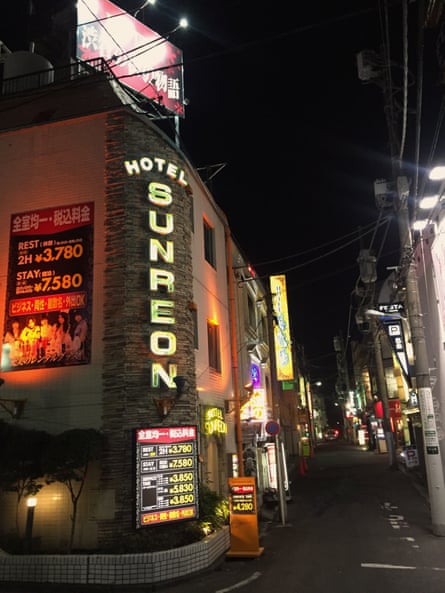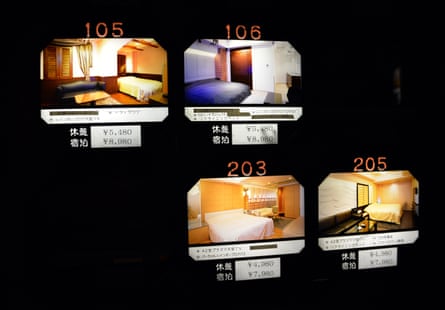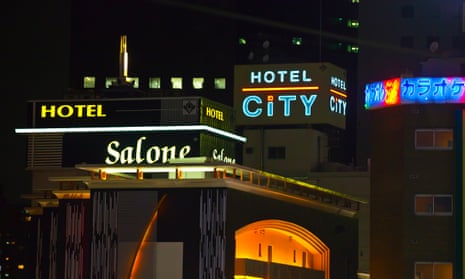While Japanese families enjoy the Christmas Eve ritual of tucking into fried chicken and sponge cake, millions of love-struck, or simply lustful, couples will discreetly observe another festive tradition with a visit to a love hotel.
They will enter a dimly lit lobby and, after a brief discussion, select a room with the push of a button. Then, for just a few thousand yen ($25-30) – handed to an unseen receptionist – they will be free to make the most of their fleeting moment of privacy. As soon as they leave, a team of cleaners will prepare the room for the next occupants.
But Japan’s love hotels are suffering from a downturn in demand from amorous couples. Instead, they are pinning their hopes of long-term survival on a surge in the number of Chinese tourists that is stretching the traditional hotel industry to breaking point.
The backstreets of Tokyo’s Dogenzaka – nicknamed Love Hotel Hill – are quiet early on a weekday evening. But on Saturday, rooms at hotels with names like Amore, Elegance and Asian Resort will be at a premium as the industry cashes in on its busiest day of the year.
From huge, faux castles strategically located at motorway intersections to scruffy ferroconcrete boxes in the suburbs, love hotels offer not just privacy and anonymity, but an array of esoteric extras for couples hoping to spice up their love life.

If mirrored ceilings and vending machines selling sex toys are not their thing, guests can opt for “concept rooms” that re-create everything from the inside of an aircraft to tropical holiday resorts.
An estimated 1.4 million Japanese visit a love hotel every day, with rooms used by an average of 2.4 couples daily. Although there are no official data, analysts believe the industry is worth between 2-3 trillion yen ($17-25bn) a year.
Yet these are uncertain times for love hotels, so named after the first of their kind – Hotel Love – opened in Osaka in the late 1960s. The rise of single households and a decline in the population of 20-29 year olds – their target demographic – means there is less call for the role love hotels once played as an escape from extended families living under one roof.
“The love hotel business is going through a difficult time,” said Shigemi Sudo, director of the Tokyo Hotel and Ryokan (Inn) Association. “This is probably because more young people live away from their family home these days, so there’s no need for them to go to a love hotel.”
Helped by government subsidies, more love hotels are renovating their facilities to appeal to overseas visitors who may not want a room with a revolving bed and fluffy handcuffs.
A record 20 million tourists visited Japan this year, thanks to a weaker yen and groups of visitors from China, who make up just under a third of the total. Having reached that milestone four years ahead of schedule, the government has set an ambitious target of 40 million by the time Tokyo hosts the Olympics in 2020.
With international and tourists hotels unable to cope with demand, the accommodation gap is being filled by capsule hotels, backpackers’ hostels, Airbnb – and love hotels.

Eager to rid themselves of their association with purely carnal desires, some advertise themselves as boutique hotels or “urban resorts”. The number of hotels with an overtly sexual theme has dwindled to around 6,000 due to falling domestic demand and a 1985 law that required the industry to present a more wholesome image.
Dimly lit receptions have been replaced with cafeterias; in the rooms, tacky décor and vending machines selling sex toys have made way for bright colours and designer cosmetics.
Hotel Will in Saitama prefecture, for example, has retained its garish neon sign outside, but inside the pink wallpaper has been replaced with plain white, and the double beds with singles. A widescreen TV and refrigerator now take up space once occupied by huge mirrors. Only the well-appointed bathroom has been left untouched.
The hotel is packed with Chinese tourists, thanks to a contract with a Chinese travel agency giving it exclusive use for its clients.
“Many tourists don’t think love hotels are seedy at all,” said Mark Schreiber, a veteran writer on Japan’s sex industry. “Operators spend a fortune on fixtures, which are different in each room. One might be done out art deco-style, and the room next store might have a Renaissance theme.”
Hotel operator Manryo has turned three love hotels in Tokyo’s Asakusa district hotels into backpackers’ hostels by adding a bar and lounge. “It just so happened the love hotels became available to us after they got into financial difficulties,” said Manryo spokeswoman Erika Yamato.
Almex, meanwhile, advertises love hotel rooms to tourists via loveinnjapan.com. The English-language site includes a manga guide for first-time guests, and there are plans to launch versions in Korean and Chinese.
“Tourists are starting to use love hotels because regular hotels are fully booked, or sometimes just because they’ve heard that they are fun places to stay,” an Almex spokesman said.
Rooms that can be rented for a few hours at a time have been around in Japan since the Edo period (1603-1868). The first modern love hotels appeared in the 1960s to cater to couples desperate to escape their extended families, who traditionally lived under one roof, for a few hours of intimacy.
An Osaka-based association of small and medium-sized hotel operators believes love hotels can provide accommodation for an additional 28 million overnight guests a year, according to the Asahi Shimbun.
“Foreign tourists generally come away from their first stay at a love with a positive impression, and guidebooks all describe them as luxurious, clean and spacious,” said Schreiber. “And you get all of that for much less than a night at the Hilton.”

Comments (…)
Sign in or create your Guardian account to join the discussion